Team Apr 29, 2024 No Comments

“What’s the data scientist’s salary in India?” Aspiring data scientists often ask this question.
You see, the data science field is constantly in demand. It combines coding, math, and business skills to uncover valuable insights from massive datasets and help businesses make smart decisions.
But if you are considering a career in this field, you might be curious how much it can pay you. After all, we all need strong reasons to jump into a career path.
In this blog post, you will know the salaries of data scientists in India and in major Indian cities. This will surely inspire you to learn and upskill to become an expert data scientist and get impressive paychecks.
And, if you actually want to learn data science, you can enroll in Ivy Pro School’s Data Science and AI Certification course in partnership with E&ICT Academy, IIT Guwahati. This solid online course will make you job-ready in just 45 weeks.
The salary of data scientists in India is affected by several factors. But before we get into the details, here’s a general figure:
Average Salary: The average salary of data scientists in India is ₹13.5 lakhs per year (Glassdoor). This salary varies within the range of ₹8 lakhs to ₹19 lakhs per year.
Starting Salary: The starting salary of data scientists in India with less than one year of experience is ₹6 lakhs per year, including tips, bonuses, and overtime pay (Payscale).
Early Career Salary: The average salary of data scientists with 1-4 years of experience is ₹9 lakhs per year. Whereas the average salary of data scientists with 5-9 years of experience is ₹15 lakhs per year (Payscale).
Senior Career Salary: A senior data scientist with 10-19 years of experience earns an average salary of ₹21 lakhs per year. Glassdoor says that a senior data scientist with over 8 years of experience can earn in a range of ₹25 lakhs to ₹52 lakhs per year.
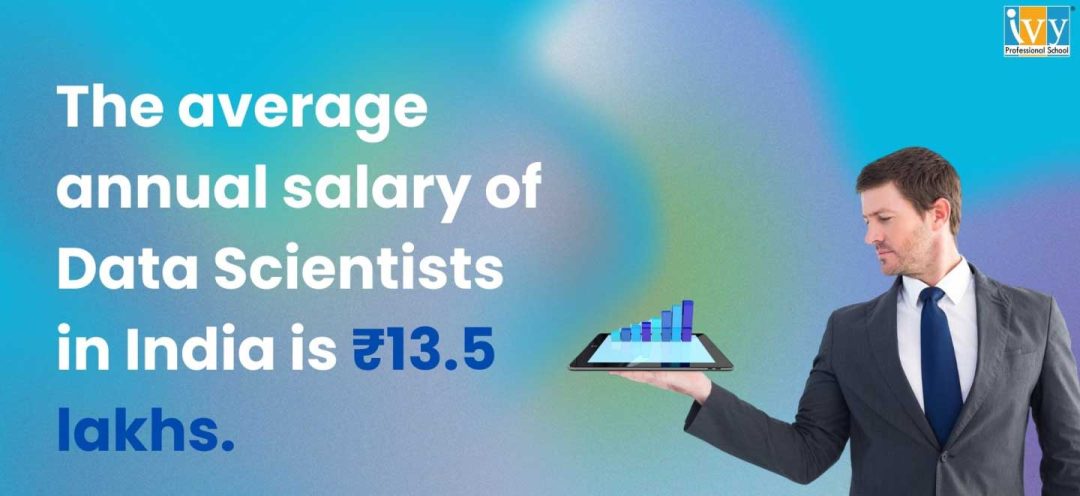
Here are some of the key factors influencing how much data scientists earn in India (there may be exceptions):
Experience: It’s what happens in most jobs – the more experienced you are, the more you are likely to earn. Freshers start at the lower end, while highly experienced data scientists with specialized skills get really handsome paychecks, some even reaching an astounding ₹52 lakhs per year (Glassdoor).
Location: Tech hubs like Bangalore, Mumbai, and Delhi usually offer better salaries compared to smaller cities due to a higher demand for data scientists and a higher cost of living. We will see the average salary of data scientists in those Indian cities in the following sections.
Industry: Some industries, like finance and e-commerce, really value data-driven insights. They’re prepared to pay more for skilled data scientists. For instance, the average annual salary of data scientists in financial services in India is ₹15.3 Lakhs (AmbitionBox).
Company Size: Generally, big-name companies and multinational corporations offer more competitive salaries and benefits packages than smaller startups. For instance, a data scientist at IBM earns an average base salary of ₹14.5 lakhs per year (Glassdoor).
So, now you realize data scientists really make big money. But there is a reason why they are paid so much. Actually, if you want to enter this field, you will be more motivated by the impact you create than the money you make. This brings us to the next section:
Here are the primary reasons why data science is one of the top 10 highest-paying jobs in the world:
Businesses Need to Understand Data: By 2025, it’s estimated the world will create roughly 463 exabytes of data daily. Businesses collect these datasets, which can be about customer behavior, market trends, machines, etc., to find valuable insights. But that data means nothing unless they can understand it. Data scientists have the skills to transform raw data into actionable insights that help companies make better decisions.
Data Scientists have Unique Skill Set: Data science is a mix of technical and business skills. Data scientists need to know not only statistics and programming but also problem-solving and communication. They also need to understand business problems and how to translate data into solutions. That’s what makes them valuable.
High Demand, Low Supply: There’s a lot more data out there than data scientists can handle. Businesses across industries are eager to find data-driven insights, but finding qualified data scientists remains a challenge. Businesses have to utilize data to survive in the market, or their competitors will win. This necessity and shortage of good data scientists drive up salaries as companies compete for top talents.
So, the thing is, companies need good data scientists. Because they rely on data-driven insights to optimize pricing, target advertising, predict customer churn, streamline logistics, and perform countless other business processes. That’s why they are willing to pay so much to skilled professionals. Now, let’s move on to the next section…
Here are some of the Indian cities that pay data scientists the most with the average salary they offer. This will help you choose the right city for jobs and make your career a fulfilling journey.
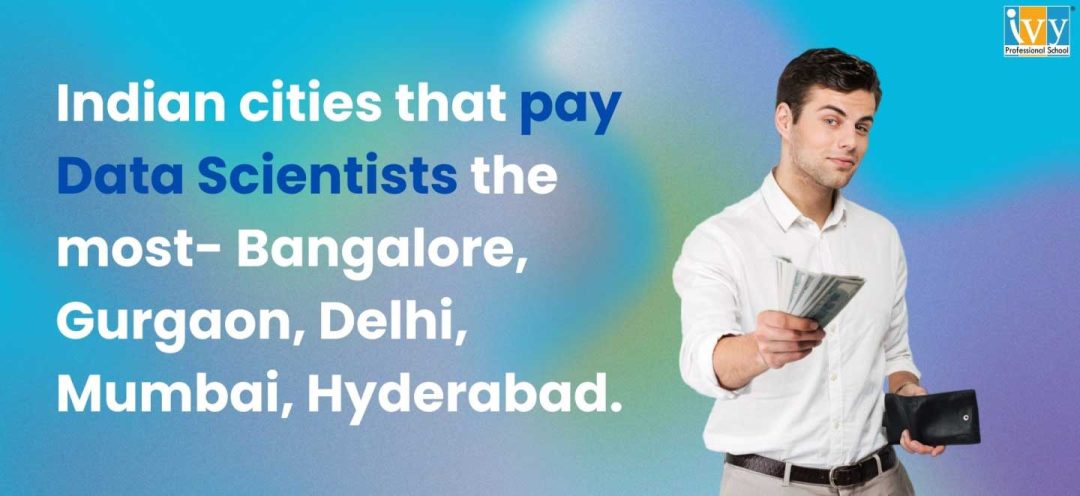
Delhi has tons of jobs for data scientists, including various sub-domains like ML, AI, and data analytics. You will find big companies, new startups, and even government projects that need skilled professionals. The average salary of data scientists in Delhi is ₹15 lakhs per year. Apart from this, you will love the delicious street food and local markets like Chandni Chowk and Sarojini Nagar.
One of the most rapidly developing cities, Gurgaon, is a favorable environment for data scientists with a significant number of job opportunities. Many multinational companies and international startups have offices there, so you will find good jobs with good pay. It’s modern and close to everything Delhi has to offer. And the average salary of data scientists in Gurgaon is ₹17 lakhs per year.
Mumbai offers a vibrant landscape for data scientists. There are multinational companies, tech firms, and startups with new data scientist positions being added daily. It’s a busy, exciting city where you can meet ambitious people. The average salary of data scientists in Mumbai is ₹16.5 lakhs per year. And in this city of dreams, you will like to spend peaceful time near the beaches and have luxurious dinners in 5-star restaurants.
Bangalore is a hotspot for data science professionals, with over 39,000 data scientist jobs. These job openings are for various domains within data science, like junior data scientists, Python developers, machine learning engineers, and data science specialists. The average salary of data scientists in Bangalore is ₹17 lakhs per year. The city offers a professional environment, with most people working in corporations. And you are certainly going to love the pleasant weather here.
Hyderabad offers thousands of data scientist jobs, with new job openings being added regularly. There are big companies and smaller startups, so you have choices of where you want to work. The average salary of data scientists in Hyderabad is ₹12 lakhs per year. It’s a more relaxed city than some of the biggest ones, so you can expect a peaceful time here. And did we mention the delicious Hyderabadi biryani?
Now that you know the data scientist’s salary in India, you must be feeling excited to enter this field.
So, if you want to learn and become a skilled data scientist, you can join Ivy Pro School’s Data Science and AI Certification course in partnership with E&ICT Academy IIT Guwahati.
This course teaches you all the industry-relevant skills like ML, AI, Cloud, Gen AI, Data Analytics, Data Visualization, etc., with tools like Adv Excel, SQL, Python, Power BI, VBA, Tensorflow, etc.
In this 45 weeks of training, you will be coached by professors from IIT and experts from Amazon, Google, Microsoft, etc, making you ready for high-paying data science jobs.
Visit this page to learn more about Ivy’s Data Science and AI Certification course.
Team Apr 23, 2024 No Comments

Data science is a very attractive career choice now. It offers excellent salaries, incredible work satisfaction, good job security, and a chance to make this world a better place.
No wonder the Bureau of Labor Statistics projects 35.2% employment growth for data scientists between 2022 and 2032.
If you want to enter this thriving field, the beginning steps can be confusing. What should you learn? What’s the syllabus of data science courses? What subjects do you need to master? All these are common questions you may have.
This blog post is here to help. We will share an updated data science course syllabus and subjects, giving you a roadmap to success. But first, let’s understand the role of data scientists and why they matter so much.
Data scientists basically find hidden patterns and insights in raw data. This helps businesses avoid guesswork and make informed decisions.
A McKinsey study found that data-driven companies are 23 times more likely to acquire customers, 6 times as likely to retain them, and 19 times as likely to be profitable. This shows why businesses are dying to hire good data scientists.
Data scientists also help businesses understand why a certain thing happened and predict what might happen in the future.
For instance, if a business finds its sales are dropping, a data scientist can help understand the cause behind it. To do this, they collect relevant data like sales numbers, website visits, customer surveys, etc. Then, they clean the data to make it organized.
Next, they use data analytics tools to analyze the data and find insights. They also use Machine Learning to examine massive data sets automatically, without any human involvement.
Finally, they communicate their findings to the business’s decision-makers. The insights help companies make better decisions about where to invest their money, what upgrades to launch, how to improve customer service, etc.
Now that you know what data scientists actually do, let’s see what data science subjects you have to study to become one.

Before we get into the syllabus of data science, let’s discuss some essential subjects you must study to become a skilled data scientist:
Databases and Big Data: In data science, you deal with massive amounts of data sets. So, you should know how to manage and process those large datasets. So here you learn databases (using SQL) and big data technologies like Hadoop and Spark.
Data Wrangling and Exploration: Real-world data is unorganized. Data wrangling helps you learn the process of cleaning and organizing data into a usable format. At the same time, data exploration involves studying the data and looking for initial patterns and relationships that might point toward deeper insights.
Data Analysis: Here, you learn how to carefully examine data to find meaningful information to support better decision-making. This is important because raw data is meaningless. Data analytics helps in extracting meaning from it and supports businesses, innovations, scientific research, etc.
Data Visualization: Numbers are boring and difficult to understand. That’s why here you learn how to use charts, graphs, and other visual tools to clearly communicate what you find in data analysis. It helps you tell stories and make complex information easier to understand.
Mathematics: This is the foundational subject in the entire data science syllabus. You will need a strong understanding of statistics, probability, linear algebra, calculus, etc. Statistics provides the tools to understand, analyze, and interpret data correctly. Linear algebra and calculus are important for developing and understanding the algorithms and models used in the field.
Programming: Data scientists use programming languages to implement everything they do. Python and R are the most popular languages you have to learn. This will help you write code to collect data, clean it, perform analyses, visualize data, build machine learning models, etc.
Machine Learning: This is an interesting thing to study. Here, you learn how to train computers to learn from data without being manually programmed. Machine learning includes various algorithms and methods that allow computers to find patterns, make predictions, and even take actions based on the data they are given.
Deep Learning: This is a subset of machine learning. Here, you learn about artificial neural networks that help in finding complex patterns from massive datasets. Deep learning has amazing applications, like computer vision, that enable image recognition for self-driving cars. It’s also found in AI chatbots and language models like ChatGPT.
Generative AI: Gen AI is the revolutionary AI model that can generate text, images, code, audio, and other types of data. It helps humans be more creative and automate repetitive processes. Here, you will learn about Generative Adversarial Networks (GANs), their applications, and how to build them using programming languages like Python.
The following data science course syllabus has been updated to meet current industry requirements. It takes you from the basics of data science to advanced concepts, teaching you all the in-demand tools you will need to solve real-world business problems.
This same syllabus is taught in Ivy Pro School’s Data Science and AI course with IIT Guwahati. This 45-week course also involves concrete projects to help you gain hands-on experience. So here we go…
The above data science course syllabus is strictly followed by Ivy Pro School’s Data Science and AI certification course. The course helps you learn industry-relevant skills, build a solid portfolio, and become job-ready in just 45 weeks.
This course is made in partnership with E&ICT Academy IIT Guwahati, where you are directly taught by professors on the IIT Guwahati campus. Besides, the IIT brand on your certificate gives you credibility and helps you stand out in interviews.
The online classes with live doubt-clearing sessions help you complete 50+ projects using industry-standard tools like SQL, Python, Keras, Tensorflow, OpenCV, Power BI, and Tableau. This is how you build an impressive portfolio that demonstrates your skills to employers.
Visit this page to learn more about Ivy’s IIT-certified Data Science and AI Certification course.
Team Apr 19, 2024 No Comments

Updated on 23rd August, 2024
Choosing a career option after graduation can feel overwhelming. There are so many options, and it’s natural to feel unsure about the best path.
The good news is that the 2024 job market is thriving, with opportunities in both traditional and unconventional careers. You just have to find a path that aligns with your interests and skills, and it will give you both financial stability and a sense of fulfillment.
This blog post shares the 5 best career options after graduation in 2024. This will help you clear the confusion, get on the right track, and build a rewarding future.
A good career lets you solve real-world problems, helps you make good money, satisfies your soul, and challenges you to grow. But with so many options, it can be difficult to know where to start. So here are some of the best career opportunities after graduation you can try:
This career option is now trending worldwide. Businesses across industries are looking for expert data scientists to transform raw data into valuable insights.
Data scientists use advanced analytics tools, programming, and problem-solving skills to uncover patterns in raw data, predict trends, and help businesses make informed decisions.
No wonder data science is a fulfilling career that offers impressive salaries and helps you make a real-world impact. In fact, the average salary of a data scientist in India is an astounding ₹12,00,000.
To become a data scientist, you may require a B.Tech degree or a bachelor’s degree in Mathematics, Statistics, or Computer Science. Many companies favor candidates with master’s degrees in data science or related fields, although strong skills and a good portfolio can open doors.
You can join Ivy Pro School’s Data Science and AI course with IIT Guwahati to learn Data Science from scratch, complete real-world projects, and land high-paying jobs in MNCs.
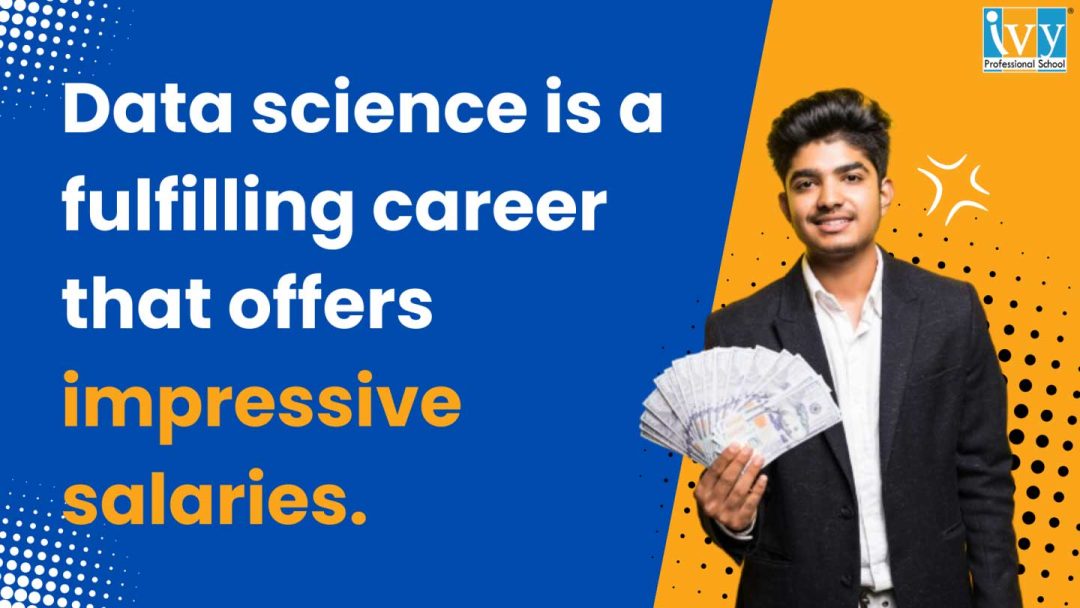
If you want a career option after graduation that doesn’t involve working 9-5, content creation can be a good choice.
As a creator, you make content on digital platforms to build an audience. The content could be videos on YouTube, reels on Instagram, blog posts on your website, stories on Medium, or written posts on LinkedIn and Twitter.
You basically have to talk about things you are passionate about. At the same time, the content should provide value to the audience, either by entertaining, educating, or inspiring them.
Content creation lets you be your own boss. You can be creative, talk about things you like, and make a positive impact on the world.
Also, you can make good money from ads and sponsorship opportunities and even sell your products. In fact, 52% of creators earn $50K-$100K per year by spending 10 hours or less per week on content creation.
However, content creation isn’t as easy as it sounds. You have to learn skills like writing, video production, storytelling, content marketing, etc. You have to consistently create content, remain updated with the world, and keep yourself positive even when things don’t work for you.
This needs no introduction. You already know how reputed a career in civil services can be. Frankly, almost every graduate thinks of becoming an IAS, IPS, or IRS at least once in their college life.
A career in civil service gives you everything you can think of- job security, good salary, job satisfaction, recognition, opportunity to serve the country.
Civil servants are the backbone of the country’s administration. They shape policies, manage public resources, and directly impact the lives of millions. A career in civil services lets you serve your country and make a tangible impact on society.
Now here comes the bitter truth: the path to becoming a civil servant is really difficult. You have to clear the highly competitive UPSC Civil Services Examination, one of the toughest examinations in the world. The extensive syllabus, subjective exams, and unpredictable question patterns make it difficult.
But if you are a hard worker with perseverance and a passion to serve the country, you may succeed and become a civil servant.
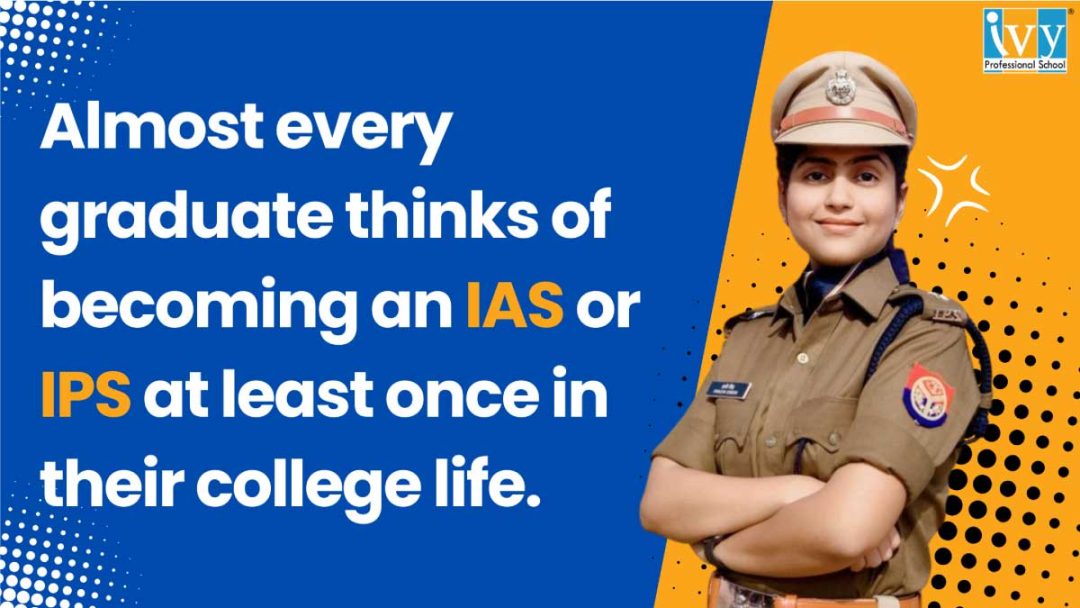
Software engineers make apps and websites we use daily. They write the code to transform ideas into functional software that solves real-world problems.
Software engineering is all about mastering programming languages like Python, Java, C++, or HTML. You will work on various stages of the development process, from coding to testing and deployment. You will also work in teams and bring big projects to life.
Since technology constantly evolves, this field lets you learn new things and face exciting new challenges. You can do a full-time job or work as a freelancer, depending on your choice. The growing demand for skilled software engineers means you will have job security and competitive salaries.
If you have a logical mind, enjoy creating something from scratch, and love technology, software development could be an incredibly rewarding path.
If you are looking for a unique career option after graduation, you can start your one-person business. This could be a good path if you like to take risks and explore different interests.
This career option lets you build products and services to help people. You can be a freelance writer, graphic designer, or website developer to sell your services. Or you can start your ecommerce store. Or you can create online courses based on your expertise. Or you can be a personal trainer and help people get fit. There are numerous ways to do it.
But whatever you choose, a one-person business gives you the ultimate freedom and flexibility. You set your hours, choose your clients or products, and pursue your passions directly. And now, using AI, you can do multiple things and boost your one-person business.
To build a successful one-person business, you have to create really good products and services. Besides, you need certain skills (writing, design, marketing, selling), an entrepreneurial mindset, a desire to work hard, and strong self-discipline. The initial months can be difficult, but when you do it consistently for a long time, you will get incredible rewards.
Now you know what the best career options after graduation are. So, if you are interested in technology and mathematics, you can choose to pursue a career in data science and AI.
Ivy Pro School’s Data Science and AI certification course with IIT Guwahati can be a good starting point.
This is an online class with live doubt-clearing sessions. You will be taught by professors from IIT and experts from companies like Amazon, Google, Microsoft, etc.
This 45-week training teaches you in-demand skills like Data analytics, ML, and Gen AI with tools like Adv Excel, SQL, Python, Power BI, and Tensorflow.
Since 2008, Ivy has trained 29,000+ graduates working in over 400 organizations. If you want to be the next one, visit this page to learn more about the Data Science and AI course.
Which careers have the highest scope in the future?
Careers with the highest scope are mostly related to technology and management. They include data scientists, AI and ML engineers, software developers, project managers, etc. The global AI market is expected to reach USD 1,345.2 billion by 2030, and the data science market is expected to reach USD 776.86 billion by 2032. This means there will be many more jobs in these fields.
Which skills are the best after graduation?
Technical skills like data science, programming, generative AI, and digital marketing are some of the best you can learn after graduation. Soft skills like communication, public speaking, negotiation, leadership, problem-solving, time management, and creative thinking can also help you a lot in your career.
What are some unique career options after graduation?
AI and ML engineering, data storytelling, ethical hacking, content creation, podcasting, life coaching, and freelancing are some unique career options after graduation. But before you choose a career, make sure you are interested and enthusiastic about it, because you will be doing it for the rest of your life.
What are the best career options after graduation in science?
An MBA, data science, machine learning, programming, research scientist, and professor are some of the best career options after graduation in science. These are just a few examples, you can conduct further research to figure out a career based on your interests and skills.
What courses can I take after graduating with a commerce degree?
Business analysis, financial analysis, data science, an MBA, accounting, and banking are some of the courses you can take after graduation in commerce. They can help you learn in-demand skills and get high-paying jobs to achieve your career goals. At Ivy Pro, we can help you become a skilled data scientist or business analyst with our comprehensive live online courses taught by experts.

Eeshani Agrawal holds an MS in Civil Engineering from Texas A&M University (USA) and has over 16 years of experience in data visualization, storytelling, and analytics. She has consulted for top engineering, manufacturing, and consulting firms worldwide and has coached over 9,000 professionals and students from leading institutions like IITs, IIMs, and ISI.
Team Apr 17, 2024 No Comments

It was 1663 in London. John Graunt, a genius statistician, did something that became a pioneering example of data analytics.
He collected and analyzed mortality data. At that time, the terrible bubonic plague caused deaths in London. His analysis let him find patterns in how many people died, where, and when.
This helped him figure out how the disease was spreading and what might be done to slow it down. Although his analysis methods were basic, Graunt showed us the power of analyzing data to understand a complex problem.
Over 360 years have passed, and data analytics have changed tremendously. Now, we have complex data coming from everywhere. The internet and digitization have created an explosion in the quantity and types of data generated.
Luckily, we have advanced computers and powerful statistical tools that help us analyze massive sets of data and find valuable insights. Now, data analysis is a rapidly growing field that helps organizations make better decisions, optimize processes, reduce risks, and improve their overall performance.
In this post, we will see what is data analytics, its application, its types, and how it’s done. Let’s start with the basics.
Data analytics involves studying raw data to find hidden patterns and useful insights.
This data could be about customer behavior, sales figures, website clicks, sensor readings, etc. This raw data is often overwhelming and difficult to understand. Data analytics provides the tools and processes to understand it.
The first thing we do to analyze data is collect data from various sources. Then, we clean and organize this data to make it accurate and consistent. Next, we apply different analytical methods to find insights in the data.
Insights helps organizations make informed decisions. For instance, businesses might use the findings to improve marketing campaigns, streamline operations, or develop new products. Similarly, scientists might use it to predict disease outbreaks or understand climate change.
No wonder, data analytics is one of the highest-paying skills in 2024.

Data analytics provides insights that replace guesswork and help make informed decisions. This optimizes processes, cuts costs, and improves outcomes for businesses. Here are some examples of how data analytics is used in real life:
These are just a few examples. Data analytics is being used in countless ways to improve our lives. And as technology advances, the applications of data analytics will only continue to expand.
Now you understand what is data analytics and what are its applications. So, let’s move on to the next section:
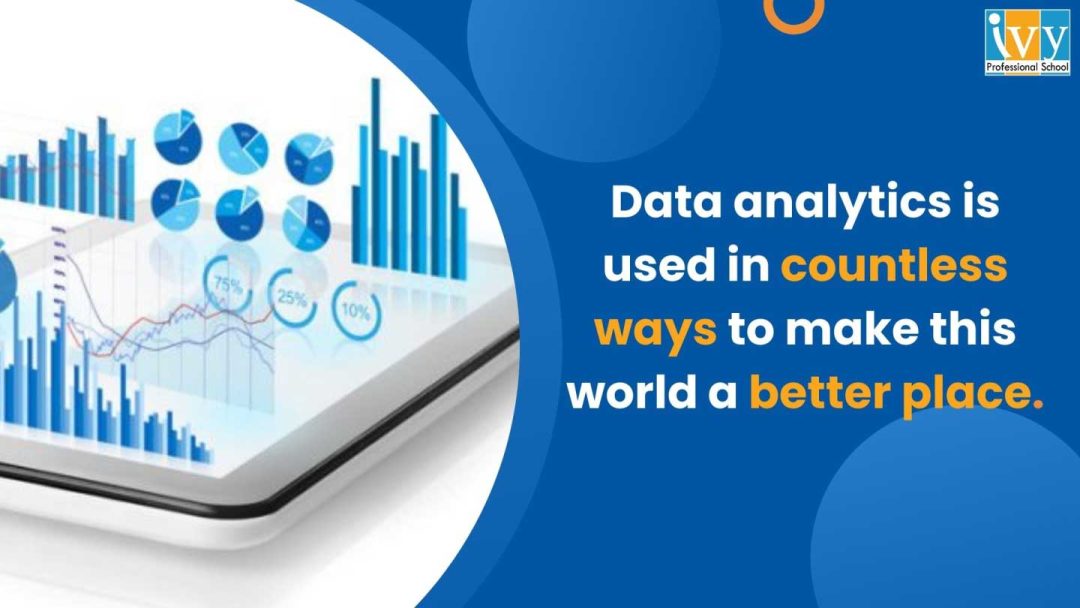
Data analytics can be divided into four main categories, each having a specific focus:
Understanding these types is crucial. It helps data analysts choose the right approach to answer specific questions and make better decisions.
So, Netflix is incredibly focused on data analytics. They track everything from what you watch to when you pause, scroll, or abandon a show. And they use this to improve recommendations. Let’s take the example of Netflix to understand the steps in data analytics:
Data analysis often requires several iterations. You may need to revisit earlier steps to collect additional data, refine your analysis methods, or answer new questions that arise during the process.
Now that you know what is data analytics, if you want to learn this in-demand skill from the basics, you can join Ivy Pro School’s Data Analytics with Visualization Certification Course.
This course will teach you all the industry-relevant tools like Adv. Excel, SQL, Tableau, Power BI, Python, etc. These skills make your resume impressive and help you land high-paying data analytics jobs.
Ivy Pro School has been a top-ranked Data Science and Analytics course provider since 2008. Fortune 500 companies like Tata Steel, Accenture, ITC, Cognizant, Capgemini, and more actively recruit Ivy’s graduates.
Visit this page to learn more about Ivy’s Data Analytics with Visualization Certification course.
Team Apr 15, 2024 No Comments

What’s the benefit of a data science course? Aspiring data scientists often get that question.
Data science is one of the most in-demand career opportunities with lucrative salaries. Doing a course helps you launch yourself in the data science world and be a part of the technology revolution. A course lets you upskill and make your career more rewarding.
If you still doubt whether you should invest in a course, this post is for you.
We have shared seven benefits of data science courses and why investing in this skill could be a great career decision.
Here are 7 reasons why taking a data science course is one of the best things to do.
Yeah, you learn a lot of skills. You master things like statistical analysis, machine learning techniques, data visualization, and programming.
These in-demand skills not only help you get the best jobs, but they’re also highly transferable across industries. Companies in healthcare, finance, e-commerce, and education – they are all looking for data science expertise.
This means your data science skills will give you unparalleled job security in a rapidly changing world.

A data science course helps you learn industry-relevant tools. Whether you are a newcomer or a professional, you gain expertise in the programming languages and software that businesses rely on.
For example, programming with Python or R, building models in platforms like TensorFlow and PyTorch, and mastering data wrangling with tools like SQL and Pandas.
If you are getting started, a data science course teaches you the fundamentals and takes you to advanced concepts. Whereas if you are a professional, a data science course lets you deepen your knowledge, explore advanced techniques, and fill in any gaps in your existing skill set.
The best data science courses go beyond theory. They help you experience projects with real-world challenges and complexities.
For instance, you may get to handle problems like analyzing customer behavior, predicting market trends, or optimizing logistical processes.
This is one of the best data science course benefits because it helps you apply your knowledge and get hands-on experience. You learn problem-solving, critical thinking, and turning data into actionable insights.
For instance, Ivy Pro School’s Data Science and AI certification course lets you complete 50+ real-world projects. These projects make your portfolio impressive. You can showcase your skills to potential employers and increase your chances of job success.
Technical skills alone are not enough to get a job. You must also know how to present yourself.
That’s why many good data science courses include comprehensive career support. They help you write a compelling resume that highlights your expertise, teach you how to appear in interviews and conduct mock interviews to boost your confidence.
This type of holistic preparation is invaluable. It not only teaches you communication skills but also makes you confident and courageous. Overall, you get a major advantage in the competitive job market.

When you complete a data science course, you get rewarded with an industry-recognized certification. Now, this isn’t just a piece of paper – it’s a symbol of credibility.
Certification tells employers that you have been examined by a reputable institution and have shown proficiency in essential data science skills.
The benefits of data science certification are remarkable. It helps you in the hiring process. The certificate sets you apart, shows your commitment to professional development, and immediately makes your resume more impactful.
Ivy Pro School’s Data Science and AI certification course is made in collaboration with IIT Guwahati, IBM, and NASSCOM. These reputed names make your certificate significantly valuable and help you land your dream job.
One of the biggest benefits of data science courses is salary increment. Whether you are switching careers or you are a professional looking to level up, a data science course can significantly boost your earning potential.
A course makes you more skilled and capable of solving problems. Businesses will need you because you can find patterns in raw data and help them make informed decisions. These decisions help businesses make millions in profits and avoid deadly mistakes.
Besides, the projects and certifications give you experience and credibility that make you irreplaceable in the job market.
You become confident when you learn new things. A course helps you with that.
A data science course gives a rigorous learning opportunity. You grasp new concepts and apply what you have learned in real-world situations. You develop the ability to think critically, approach problems with a new perspective, and trust your data-driven solutions.
This confidence boosts your career. You speak with authority, take calculated risks, and face challenges with an “I can do this!” attitude. Apart from the job skills, a course helps you become a new person and unlock your full potential.
Now you know the benefits of data science courses. So, if you want to make a career in this thriving field, it’s time to make your move.
Ivy Pro School, in collaboration with IIT Guwahati, offers a comprehensive Data Science and AI certification course designed to fast-track your success. It lets you:
This is your chance to be a data science expert and make your career more rewarding. Visit this page to learn more about the course.
Team Apr 08, 2024 No Comments

AI is everywhere. From ChatGPT to Tesla electric cars, we are now surrounded by AI technology. With all the amazing things AI can do, more and more people are interested in learning AI and becoming a part of this technological revolution.
If you are one of those people, the first thing that would come to your mind is: Is AI hard to learn? To be honest, it seems hard. The thought of complex algorithms and years of dedicated study may appear intimidating.
The truth? We will explore exactly that in this post. Keep reading, and you will know whether AI is hard to learn, what you require to learn it, and some tips to master the skill.
The simple answer is it depends. If you have a smart approach with which you develop the required AI skills and practice them consistently, you will learn it without much difficulty. But if you don’t have any study plan, the right resources, or the discipline, it will definitely feel harder.
The truth is that learning AI is a journey. You need a good understanding of programming and math, an ability to keep up with a rapidly changing field, and a drive to constantly learn and grow. The good thing is it doesn’t need any special talent. Anybody dedicated and curious would be able to learn AI.
And remember that nothing worth having comes easy. If you set out to learn AI, and it appears somewhat hard, remember that it will be worth it. Because right now, AI is in big demand. Learning AI can take you to your dream job with impressive pay and work satisfaction.
So, the question is not, “Is AI hard to learn.” The real question is what it takes to learn AI. And that brings us to the next section.
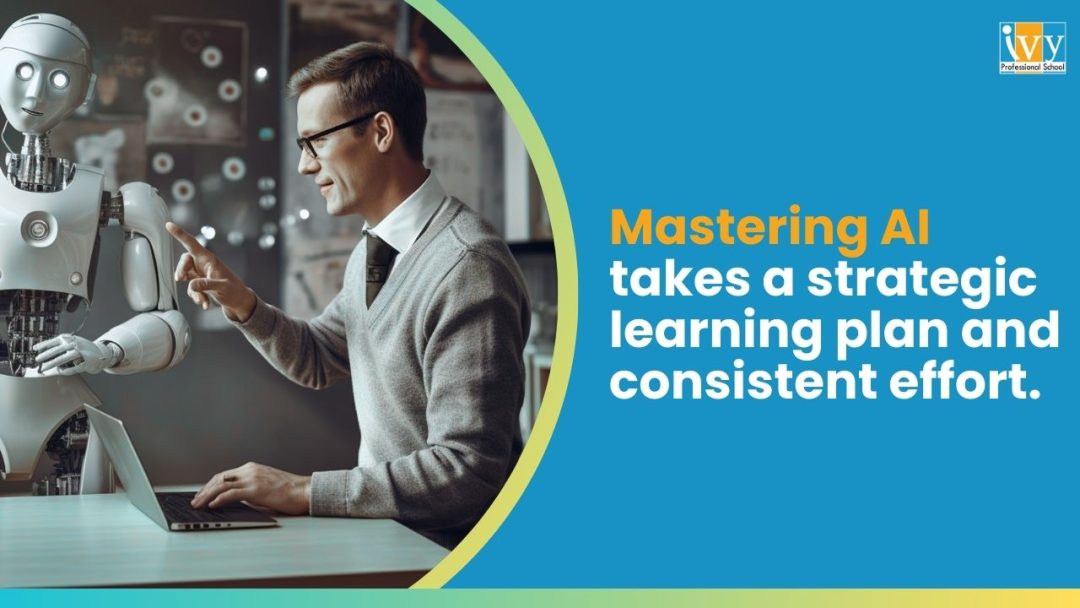
Here are the essential skills you will need to get started with AI:
So, is AI hard to study? Well, getting started with AI might feel overwhelming, but a strategic approach will make your journey much smoother. So, here are 4 actionable tips that will help you master AI:
Take small steps by learning the basics. Here is what you can start with:
Once you have built a strong foundation, you can explore the next level skills:
Here are some of the most widely-used AI tools within the Python ecosystem:
Artificial intelligence can be difficult to learn if you keep memorizing theory. The best way to solidify your AI skills is to get real-world experience.
You can start with small, well-defined projects that align with your interests. For example, try building a basic image classifier, a sentiment analysis tool for social media posts, or a game-playing AI using reinforcement learning.
The process of working through problems, debugging code, and seeing your AI models come to life will help you learn more than just reading theory.
If you want to learn AI without much hassle, you can join Ivy Pro School’s Data Science and AI certification course.
This is an online course where you will learn all the topics like Data Analytics, Visualization, Machine Learning, Deep Learning, and Gen AI with tools like Adv. Excel, SQL, Python, Keras, Tensorflow, etc.
This course is in collaboration with IIT Guwahati, IBM, and NASSCOM. This triple certification will help you stand out in the eyes of recruiters and secure better job opportunities.
Besides, you will be taught by professors from IIT and professionals from companies like Google, Amazon, and Microsoft, which means the teaching will be world-class.
If you are still wondering, “Is AI hard to learn?” you will figure it out in this course.
Team Apr 04, 2024 No Comments

Why be a data scientist? Well, the simplest answer is data science is a perfect career, with high job security, impressive salary, and work satisfaction.
Data science employment is projected to grow at an astounding 35% from 2022 to 2032, which is more than the average for all occupations. And approximately 17,700 annual openings are expected for data scientists over the decade.
A data science career involves collecting, cleaning, and analyzing complex datasets to uncover patterns, trends, and insights. Those insights are what help companies make better decisions about products, marketing, or business strategy.
But what makes data science such a hot career?
In this blog post, we will see in detail the 7 reasons to become a data scientist. By the end of this blog, you will know why you should choose this career and how you can start your journey.
If you are interested in maths, statistics, and computers, data science might be the path you should choose. It’s a career that challenges you, lets you learn new things, and helps you grow. Here are the top 7 reasons why data science as a career could be a great choice for you.
Yeah, if you are a skilled data scientist, you may get plenty of job offers. Why? Businesses are drowning in data. They have data coming from everywhere- from online purchases, social media, or market behaviors. But they don’t know what that data means.
So, companies need experts to study those data and uncover hidden patterns and trends for informed decision-making. Data scientists are the ones who make sense of that data. They study the raw numbers and transform them into insights that help organizations make better business decisions.
That’s how data science helps businesses gain a competitive advantage, putting the skill in high demand. Now you know why a career in data science could be a good option for you.
Let’s be honest. We all want jobs that pay not only our expenses but also help us fulfill our desires.
Data scientists definitely have that covered. According to Glassdoor, the average salary for data scientists in India is an impressive ₹12,59,993 per year.
The amount may vary depending on the job location and your experiences, but the earning potential in this field is seriously impressive. That’s a good reason to become a data scientist.
And it makes sense to pay skilled data scientists well. After all, they help the company make smart business decisions that directly impact a company’s bottom line.
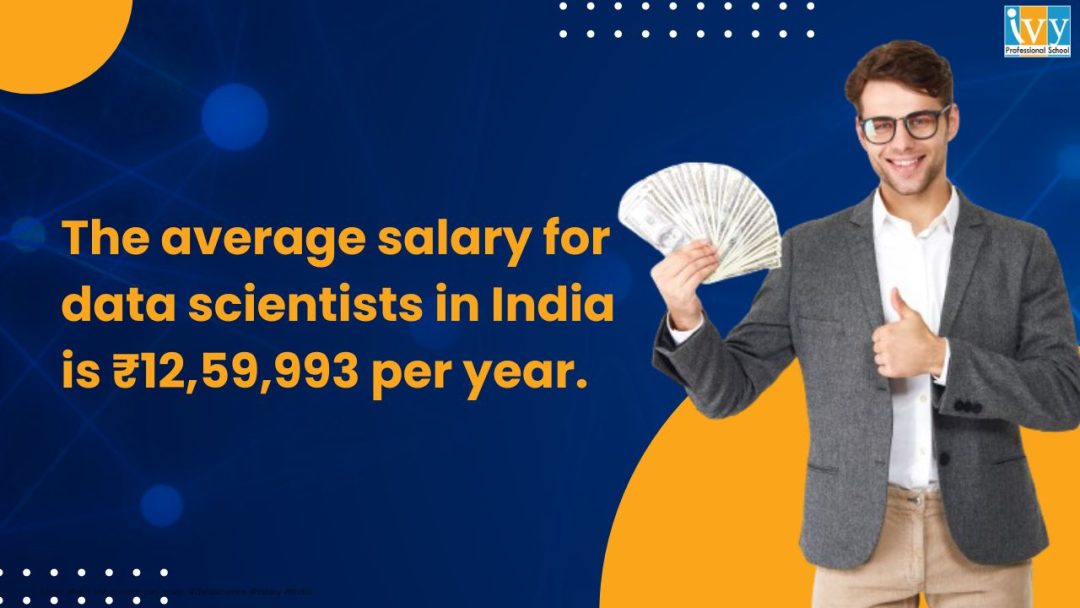
Data science consists of many skills. You will study programming languages like Python and R, statistics, machine learning, data visualization, cloud computing, etc.
This versatile skill set opens many doors across various industries. You could become a data scientist in financial institutions, analyzing market trends. You can enter the healthcare industry and help innovate medical research. Or, if you love movies, you can take a role in movie studios to predict box office success and optimize marketing campaigns.
So, why be a data scientist? Well, because data science won’t trap you in a single career path. As your interests evolve, so can your job.
At its heart, data science is all about solving problems. You study the data to find answers to real-world questions.
And this process of problem-solving makes you good at the thing. You learn to break down complex challenges into smaller steps, think creatively, and find better solutions backed by data. That’s why a career in data science is a good option for those seeking to grow in life.
The ability to solve problems helps wherever you go. Whether you’re managing a project, stuck in a difficult situation at work, or simply figuring out which smartphone to buy, problem-solving skills are a lifesaver.
Why be a data scientist? Well, it doesn’t only add numbers to your bank balance, it also lets you make an impact on the world.
Data science lets you solve the world’s biggest problems that positively impact the masses.
As a skilled data scientist, you can help fight disease by analyzing medical records, improving education using insights about how students learn, or even combating climate change by analyzing energy consumption.
Working in data science means you can put your skills toward causes you really believe in. This is what makes the work meaningful, and it’s one of the best reasons to study data science.
One of the impressive reasons to become a data scientist is that this career not only teaches you technical skills but also improves your personality. For instance, data science projects teach you how to work in a team, communicate complex ideas, and manage different perspectives in a group.
This helps you develop your soft skills and become good with people. You also learn to manage professional and personal relationships. Besides, data science teaches you to be analytical, which helps you see situations from unique angles, think critically, and make smart decisions.
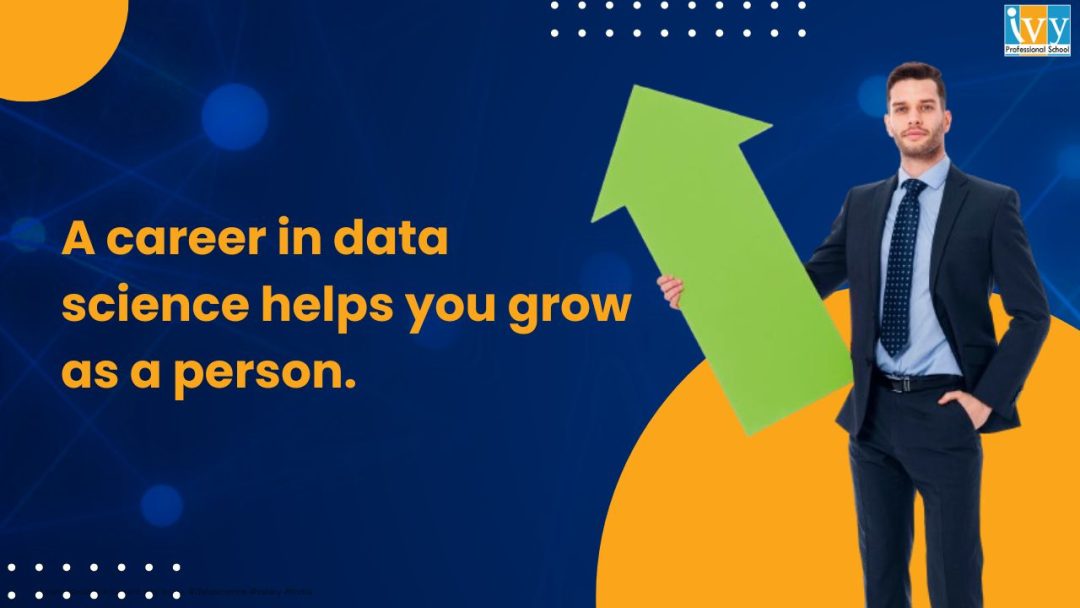
This is an underrated reason to become a data scientist. Job satisfaction is crucial for a happy and fulfilling life. And data science helps you achieve that.
You see, data science is a mentally stimulating career, full of puzzles to solve and new things to learn. You get to be creative, collaborate with people, and find solutions that make a real-world impact.
And then you see the tangible impact of your work, whether that’s a new product launch, detecting fraudulent financial transactions, or helping an NGO in fundraising. This fulfills you from within and makes you satisfied.
Now that you know 7 reasons to become a data scientist, I guess you must be excited about this career path and wondering where to begin. Well, here are three things you could do to start your career:
Taking online courses may be the best and fastest way to master this skill. You can consider Ivy Pro School’s executive certification course in Data Science and AI.
This program is in collaboration with IIT Guwahati, IBM, and NASSCOM, so you can already understand the importance of its certification.
Besides, professors from IIT and professionals from companies like Google, Amazon, and Microsoft will be teaching you so that you become job-ready.
In this online course with live doubt-clearing sessions, you will learn all the in-demand topics like Data Analytics, Visualization, Machine Learning, and tools like Adv. Excel, SQL, Python, Power BI, etc.
You already know the reasons to become a data scientist. Now, if you want to master this skill, visit this page to learn more about the Data Science and AI executive certification course.